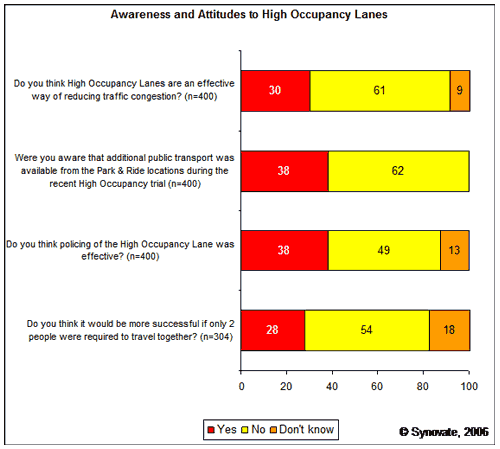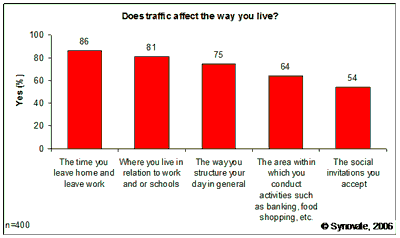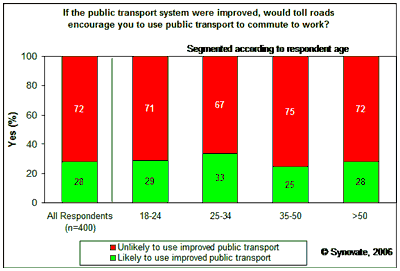
Gauteng traffic: braving the rush hour
30% of Gauteng motorists believe that the High Occupancy Vehicle (HOV) strategy could work in reducing traffic congestion, according to the recent Synovate Rush Hour Survey.
Only 22% of respondents interviewed were positive in their evaluation of the recent trial over the week of the 23rd - 27th October initiated by the Department of Transport, where one lane on selected highways was closed to those travelling with only one or two persons in their vehicle. Just over half of those interviewed (55%) deemed this exercise to have been unsuccessful.
The study surveyed 400 Gauteng motorists with regard to traffic and traffic congestion solutions. Most of the respondents interviewed owned a motor vehicle of their own and all respondents reside in Johannesburg or Pretoria.
When assessing the recent HOV trial, three quarters (75%) of respondents felt that there was not enough communication about the park and ride facilities provided at certain locations in Pretoria and Johannesburg. Fifty five percent (55%) felt that the communication on the closure of the HOV lane had also not been effective. However, when asked whether they would use the park and ride service, 67% of motorists said they would not use it. The main reasons cited included lack of flexibility (50%), inconvenience (49%), and the fact that one has to rely on other people (48%).
Did the HOV lane closure have any effect on traffic elsewhere? Thirty six percent (36%) of respondents noted an increase in traffic on secondary roads as commuters most probably tried to avoid the highways.
When asked whether the Department of Transport should try the HOV strategy again, but using better advertising, 55% of respondents agreed that it should.

Gauteng's traffic congestion has undoubtedly had a major effect on those living in Johannesburg and Pretoria. The Synovate Rush Hour study found that over a third (35%) of Gautengers spend over an hour or sometimes even over two hours, sitting in traffic every day.
When asked how traffic affects daily decisions, 86% of Gautengers appear to base decisions on when to leave home and work on the traffic expected along the way. It was most surprising to note that four out of every five (81%) Gauteng motorists decide where to live in relation to work or schools based on the traffic in those areas. Three quarters (75%) also take traffic into consideration when structuring their day-to-day living.

Most Gauteng drivers are in agreement that the reason for traffic congestion lies in the fact that there are too many cars or not enough roads (96%). Other significant factors creating traffic congestion according to Gauteng motorists include too many vehicles other than cars sharing the roads (trucks and motorbikes for example) (89%), as well as taxis (83%) and poor road infrastructure and planning (79%).
New vehicle sales statistics for the month of October 2006 show that on a year to date basis, the new car market in terms of new car sales reported by NAAMSA is 15% ahead of the corresponding month last year, thus substantially adding to the number of cars on the road today.

Seventy nine percent (79%) of those interviewed cite selfish and uneducated drivers as a main reason for traffic congestion. A similar study in December last year identified this factor as the largest for traffic congestion. Although the previous study included commuters in Durban and Cape Town, 73% of drivers and public transport users last year agreed that selfish and uneducated driving was the main reason for the traffic congestion on South African roads.
What solutions are there?
Apart from the recent HOV strategy pilot, there are two other possible solutions for Gauteng traffic congestion put forward by the Department of Transport and provincial administration.
The Gautrain has gained the most acceptance and confidence amongst Gauteng drivers and public transport users. More than half (52%) of respondents interviewed agreed that the Gautrain would clear up our roads to an extent. It is interesting to note that a higher proportion of Johannesburg residents (57%) than Pretoria residents (46%) believe this will be the case.
A similar Synovate study conducted in April this year found that 48% of current Pretoria - Johannesburg commuters would use the Gautrain. According to this study, the biggest factor influencing them not to use the Gautrain was safety and security.
Another solution to traffic congestion suggested by the Department of Transport is the introduction of Toll Roads on high density roads in and around Gauteng. Sixty eight percent (68%) of respondents in the current survey do not believe this to be a solution to the traffic congestion experienced presently. Although 71% of respondents were aware of the proposed toll roads to alleviate traffic, only 30% are in favour of the plan. The majority of respondents (72%) stated that they would not be likely to use public transport in order to reduce private car usage - even if public transport was substantially improved, indicating a reluctance on the part of motorists to give up the independence of driving one's own vehicle.
As at all Toll Road Junctions, commuters have to pay to travel on the road. During busy periods, queuing at existing Toll Road Junctions is commonplace. The question is, how will that impact on traffic congestion when Toll Roads are introduced in Gauteng? Eighty six percent (86%) of respondents think this would cause further delays on the road and in particular during rush hour traffic.

About the Survey
The Synovate Rush Hour survey was conducted within the Gauteng province to gauge the perceptions and opinions of motorists about traffic congestion and strategies to relieve it. The sample size was 400 (weighted to be representative of the Gauteng motorist population in terms of demographics)
Interviews were conducted face-to-face using the intercept method.
Similar Synovate surveys include:
Please visit www.synovate.co.za to read more about these studies.
Ipsos is an innovative, entrepreneurial, client-focused organisation, providing research services to clients on a global basis. We set ourselves high standards and aim to work collaboratively in partnership with our teams in order to service our clients most effectively.
- Unlocking the value of creativity in advertising: How to bridge the creativity gap15 Apr 13:47
- 4 habits keeping your brand poor26 Mar 16:08
- Understanding consumer mindsets for growth in 202407 Mar 08:52
- South Africa's unemployment nightmare: The burden on its people09 May 10:05
- Global survey shows shrinking trust in internet29 Nov 10:17












